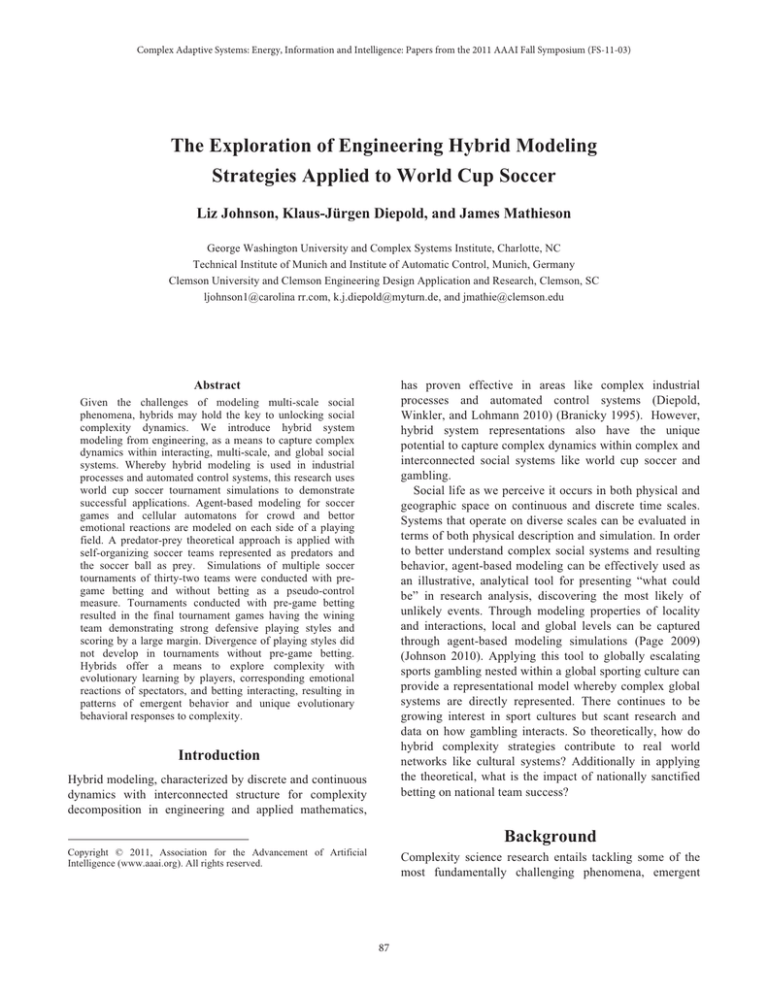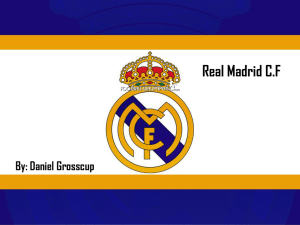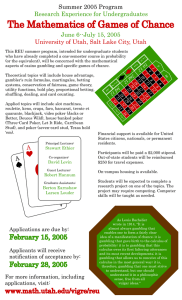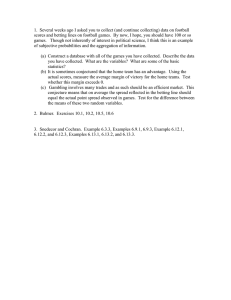
Complex Adaptive Systems: Energy, Information and Intelligence: Papers from the 2011 AAAI Fall Symposium (FS-11-03)
The Exploration of Engineering Hybrid Modeling
Strategies Applied to World Cup Soccer
Liz Johnson, Klaus-Jürgen Diepold, and James Mathieson
George Washington University and Complex Systems Institute, Charlotte, NC
Technical Institute of Munich and Institute of Automatic Control, Munich, Germany
Clemson University and Clemson Engineering Design Application and Research, Clemson, SC
ljohnson1@carolina rr.com, k.j.diepold@myturn.de, and jmathie@clemson.edu
has proven effective in areas like complex industrial
processes and automated control systems (Diepold,
Winkler, and Lohmann 2010) (Branicky 1995). However,
hybrid system representations also have the unique
potential to capture complex dynamics within complex and
interconnected social systems like world cup soccer and
gambling.
Social life as we perceive it occurs in both physical and
geographic space on continuous and discrete time scales.
Systems that operate on diverse scales can be evaluated in
terms of both physical description and simulation. In order
to better understand complex social systems and resulting
behavior, agent-based modeling can be effectively used as
an illustrative, analytical tool for presenting “what could
be” in research analysis, discovering the most likely of
unlikely events. Through modeling properties of locality
and interactions, local and global levels can be captured
through agent-based modeling simulations (Page 2009)
(Johnson 2010). Applying this tool to globally escalating
sports gambling nested within a global sporting culture can
provide a representational model whereby complex global
systems are directly represented. There continues to be
growing interest in sport cultures but scant research and
data on how gambling interacts. So theoretically, how do
hybrid complexity strategies contribute to real world
networks like cultural systems? Additionally in applying
the theoretical, what is the impact of nationally sanctified
betting on national team success?
Abstract
Given the challenges of modeling multi-scale social
phenomena, hybrids may hold the key to unlocking social
complexity dynamics. We introduce hybrid system
modeling from engineering, as a means to capture complex
dynamics within interacting, multi-scale, and global social
systems. Whereby hybrid modeling is used in industrial
processes and automated control systems, this research uses
world cup soccer tournament simulations to demonstrate
successful applications. Agent-based modeling for soccer
games and cellular automatons for crowd and bettor
emotional reactions are modeled on each side of a playing
field. A predator-prey theoretical approach is applied with
self-organizing soccer teams represented as predators and
the soccer ball as prey. Simulations of multiple soccer
tournaments of thirty-two teams were conducted with pregame betting and without betting as a pseudo-control
measure. Tournaments conducted with pre-game betting
resulted in the final tournament games having the wining
team demonstrating strong defensive playing styles and
scoring by a large margin. Divergence of playing styles did
not develop in tournaments without pre-game betting.
Hybrids offer a means to explore complexity with
evolutionary learning by players, corresponding emotional
reactions of spectators, and betting interacting, resulting in
patterns of emergent behavior and unique evolutionary
behavioral responses to complexity.
Introduction
Hybrid modeling, characterized by discrete and continuous
dynamics with interconnected structure for complexity
decomposition in engineering and applied mathematics,
Background
Copyright © 2011, Association for the Advancement of Artificial
Intelligence (www.aaai.org). All rights reserved.
Complexity science research entails tackling some of the
most fundamentally challenging phenomena, emergent
87
organization of interrelating agents of global systems.
Complexity science continues to offer new insights and
understanding of complex adaptive systems (CAS) we find
in the world around us. However, in one entire system the
number of subsystems, varying scales, levels and
directions of interactions, can be daunting to include in a
single agent-based model. In response, the blending of
established agent-based modeling techniques can be
incorporated into an interacting network to create a hybrid
framework to address this. A hybrid framework allows for
combining agent-base model types with varying structures,
on various scales, and with simultaneous interactions into
one model. A hybrid approach additionally, allows for
flexibility and provides the capacity to capture multi-level
interactions of different complex systems nested within the
entire system. Whereby hybrid approaches to complex
systems have been successfully used in engineering, there
is an opportunity to expand this approach and apply the
framework to non-linear, social systems of complexity.
Also, a bottom-up approach of agent self-organization can
be integrated into a hybrid to better mirror the real world of
social phenomena.
of the soccer games with 32 teams competing in the
tournament. The world cup soccer players and teams are
represented as predators, and the soccer ball as prey,
impacting local and global interactions by logic-based
modeling. Each soccer player has attributes like error rate
for goal shot or passes, level of aggressiveness, and selfconfidence. These attributes are continuously adapted
based on differential equations during each game. The
connecting parameter between the players’ attributes and
the spectators is the game atmosphere inside the stadium,
which clearly depends on the players, as well as on the
spectators.
The soccer spectators are modeled via recurrent fuzzybased cellular automaton as follows: emotional states x
(e.g. happy, angry, and disappointed) were defined. A rule
based interconnection of the actual state of a person x(t),
its neighbor’s emotional state, and their odds (winning or
losing money) lead to their new emotional state x(t + 1).
To overcome the disadvantage of a conventional cellular
automaton, which just allows staying in a strict defined
state, the automaton represented in the model are expressed
as a recurrent fuzzy system. This enables a person to be in
a state x(t), which is somewhere in-between all the
defined x(t).
Model Description
The agent-based model is an event-driven, bottom-up
complex adaptive system (CAS) simulation whereby
soccer players, global crowd, and betting agents have an
opportunity for interactions in their respective
environments in each iteration. The soccer players are
endowed with evolutionary learning capacity. Each time a
player makes a mistake like allowing a goal, allowing a
pass, or causing a turnover, they lose a point. Each time a
player makes a good play like steal, block opponent, score
goal, or successfully make a pass, they gain a point. Over a
number of events some players get replaced. The new
player is created from the playing statistics randomly
generated on a normal distribution of the means of the
average players. The model is scaled on the level of the
soccer players and game, stadium with crowds, and global
scale of spectators and possible bettors.
The global gambling odds in the world cup soccer
simulation are represented by time discrete differential
equations iterating from one game to the next. As human
behavior is non-deterministic, a Gaussian distributionbased random variance of the above-defined deterministic
behaviors is enabled.
Overall Hybrid System
The model is based on three sub-systems comprised of a
soccer game, global crowd, and global gambling. The
systems are interconnected and loops exist leading to
dynamical behavior during one game event. The soccer
game agent-base model, crowd cellular automatons, and
global gambling as a discrete-event driven system, iterate
from one game to the next. Thus the model captures
information from one game to the next and information
within one game, which results in a multi-time scale
expression or a complex hybrid system.
The model employs agents that are sorted into two teams
and operate on self-organization properties. The crowd
agents serve as spectators that can influence the game by
emotional responses and in turn the game actions can
influence them emotionally.
1.Agent-Based Model
Players: attributes a(t), error rate r(t), atmosphere x(t)
Methods
The simulation employs a combination of logic (agentbased) modeling, cellular automaton (recurrent fuzzybased), and differential equations which all interact
simultaneously creating the hybrid systems’ dynamics. A
predator-prey theoretical approach is applied for simulation
2.Cellular Automaton
Game-based: crowd emotional responses to game getting
close, very close, and goal.
Neighbor-based: Moore Neighborhood.
88
Gambling-based: sports betting, winning or losing money.
government sanctioned gambling countries, along with
correlating symptoms of gambling addiction and related
personal debt issues. Hybrid modeling strategies can be
implemented to further address these concerns.
3.Gambling Recurrent Fuzzy Model-Gambling odds
g(t), winning team s(t), bookie.
Crowd behavior depending on probability
This research shows hybrid-modeling strategies can be
effectively applied to complex social system phenomena.
Hybrids can demonstrate the features of complex adaptive
systems (CAS) of emergence, unique behavioral responses
to complexity, and self-organization descriptions. Hybrid
strategies applied to social systems offer great potential
modeling interacting systems with limited resources. These
represent a wide-range of complex adaptive systems
(CAS).
x(t + 1) = f(p, x(t),g(game)
Actual betting situation neighbors surrounding each person
x(t + 1) = f(p, x(t), x’)
Soccer game
x(t + 1) f)p, x,(t), d(t,a(t)))
4.Merging the equations together:
Attributes of the soccer player, which depends on the
crowd:
Acknowledgements
x(t + 1) = f(px, x(t), d(a(t)), g(game))
The second author thanks the German Research Foundation
(DFG) for funding his part of the research as part of a
collaborative project “Managing cycles in innovative processes –
Integrated development of product service systems based on
technical products: (SFB 768).
a(t + 1) = f(p, a(t), x(t), r(t), a(t))
Evolving gambling iterates from one game to the next:
g(game + 1) = f(pg, g(game), s(a(t))
Initial values of the player’s attributes and crowd’s mood
for new game are calculated based on the old game:
References
ao(game =1) = f(p, a(game))
xo(game = 1) = f(px, x(game))
American Gambling Association. 2010. Retrieved on June, 16,
2010 from
http://www.americangaming.org/federal_issues/index.cfm
Results
Branicky, M. S. 1995. Studies in hybrid systems: Modeling,
analysis, and control. Ph.D diss. Department of Electrical
Engineering and Computer Science, Massachusetts Institute of
Technology, Cambridge, MA.
The results show pre-game betting has a significant impact
on the outcome of the final tournament game. Simulations
with gambling most notably demonstrate the final game
evolving into strategies whereby; one team displays strong
defensive characteristics such as man-to-man coverage. In
contrast, the opposing teams focus almost entirely on
strong offensive characteristics such as effective passing.
Further results demonstrate that a more defense-oriented
team is almost always the winner of the tournament by a
wide margin. Additionally, the divergence of playing styles
does not appear to develop and evolve in non-gambling
simulations. Further research is needed to support
preliminary evidence that betting may contribute to a
team’s unique style of play and the ultimate creation of
vastly superior teams.
Diepold, K. J., Winkler, F. J. & Lohmann, B. 2010. Systematic
hybrid state modeling of complex dynamical systems: The quadI/HS framework. Mathematical and Computer Modeling of
Dynamical Systems 16(4): 347-371.
Gilbert, N. 2008. Agent based models: Quantitative applications
in the social sciences. Thousand Oaks, CA: Sage Publications.
Griffiths, M. 2003. Internet gambling: Issues, concerns, and
recommendations. CyberPsychology & Behavior, 6(6).
Johnson, L. Agent-based modeling overview: A guide for public
policy practitioners. 2010. Charlotte, NC, Complex Systems
Institute.
Conclusions
King, D. Delfabbro, P. & Griffiths, M. 2009. The convergence of
gambling and digital media: Implications for gambling in young
people. Journal of Gambling Studies, 26(2).
The goal of this research is to gain more insight into the
complex dynamics of global social cultural systems, which
were modeled in the form of world cup soccer. We believe
this type of research can be further developed to expand
the modeling of gambling behaviors, attitudes, and trends
from a global perspective. There is yet to be substantial
data on critical areas of concern like portion of global
population that gambles on sports legally and in non-
Page, S.C., 2009. Understanding complexity. Chantilly, VA:
The Teaching Company.
Sports Gambling-The Effects of Illegal Sports Gambling Society
2010. Retrieved on June 14, 2010 from
89
http://www.libraryindex.com/pages/1613/Sports-GamblingILLEGAL-SPORTS-GAMBLING.html and
http://www.libraryindex.com/pages/1614/Sports-GamblingEFFECTS-ILLEGAL-SPORTS-GAMBLING-ONSOCIETY html
(Ste-marie, C., Gupta, R., & Derevensky, J. 2003. Anxiety and
social stress related to adolescent gambling behavior.
International Gambling Studies, 2(1): 123-141.
Stinchfield, R. & Winters, K. C. 1998. Gambling and problem
gambling among youths. Annals of the American Academy of
Political and Social Science, 556.
Strogatz, S. H. 2001. Exploring complex networks. Nature, 410:
268-276.
Teenage Gambling Problem is Epidemic 2010. Retrieved on June
14, 2010 from 90






